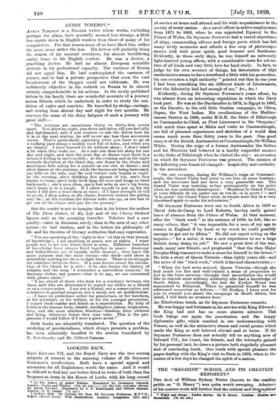ANTON TOHEHOV.*
ANTON TCHEROV is a Russian writer whose works, excluding perhaps the plays, have generally seemed less strange, a little less upside down to English readers than those of many of his compatriots. For that reason some of us have liked him rather the more, some rather the less. His letters will_probably bring the reason of his unusual usualness, his almost bewildering sanity home to his English readers. He was a doctor, a practising doctor. He had an almost European scientific attitude in his professional capacity. The vastness of Russia did not appal him. He had contemplated the vastness of science, and he had a private perspective that even the vast formlessness of the Steppes could not obliterate. He was sufficiently objective in his outlook on Russia to be almost entirely comprehensible in his actions. In the newly published letters to his family there are wonderful accounts of a journey across Siberia which he undertook in order to study • the con- dition of exiles and convicts. He travelled by sledge, carriage, and rowing boat almost day and night for . two months. He conveys the sense of the dizzy fatigues of such a journey with great skill :— " The stations are sometimes thirty to thirty-five versts apart. You drive by night, you-drive and drive, till you feel silly and lightheaded, and if you venture to ask the driver how far it is to the next station, he will never say less than seventeen versts. That's particularly agonizing when you have to go at a walking pace along a muddy road Rill of holes, and when you are thirsty. I have learned to do without sleep ; I don't mind a bit when they wake me. As a rule one does not sleep for one day and night, and then the next day,at dinner-time there is a strained feeling in one's eyelids. in the evening and in the night towards daybreak of the third :lay, one dozes in the chaise and sometimes falls asleep for a minute as one sits at dinner ; and after dinner at the stations, while the horses are being harnessed, one lolls on the sofa, and the real torture only begins at night. In the evening, after drinking five glasses of tea, one's face begins to burn, one's body feels limp all over and longs to bend backwards ; one's eyes close, one's feet ache in one's big boots, one's brain is in a tangle. If I allow myself to put up for the night I fall into a dead sleep at once ; if I have strength of will to go on, I drop asleep in the chaise, however violent the jolting may be ; at the stations the drivers wake one up, as one has to get out of the chaise and pay for the journey."
But.the reader is not to imagine that in his letters the author of The Three Sisters, of My Life and of the Cherry Orchard figures only as the gossiping traveller. Tchehov had a rare quality—rarer -in Russians, surely, than in the men of any other nation—he had wisdom, and in the letters his philosophy of life and his theories of literary aesthetics find easy expression.
" You are speaking of the right to live ' of this or that branch of knowledge ; I am speaking of peace, not of rights. I want people not to see war where there is none. Different branches of knowledge have always lived together in peace. Anatomy and belles-lettres are of equally noble descent ; -they have the same purpose and the same enemy—the devil—and there is absolutely nothing for them to fight about. There is no struggle for existence between them. If a man knows about the circula- tion of the blood, he is rich ; if he also learns the history of religion and the song ' I -remember a marvellous moment,' he becomes richer, not poorer—that is to say, we are concerned with pluses alone."
" I am afraid of those who look for a tendency between the .lines, -and who are determined to regard me either as a liberal or as a conservative. I am not a liberal, not a conservative, not a believer in gradual progress, not a monk, not an indifferentist. . . . I have no preference either for gendarmes, or for butchers, or for scientists, or for writers, or for the younger generation. I regard trade-marks and labels as a superstition. My holy of holies is the human body, health, intelligence, talent, inspiration, love, and the -most absolute freedom—freedom from violence and lying, whatever forms they may take. This is the pro- gramme I would follow if I were a great artist."
Both books are admirably translated. The question of the rendering of provincialisms, which always presents a problem, has been admirably handled in the stories translated by M. Kotelionsky and Mr. Gilbert Cannan.


































 Previous page
Previous page